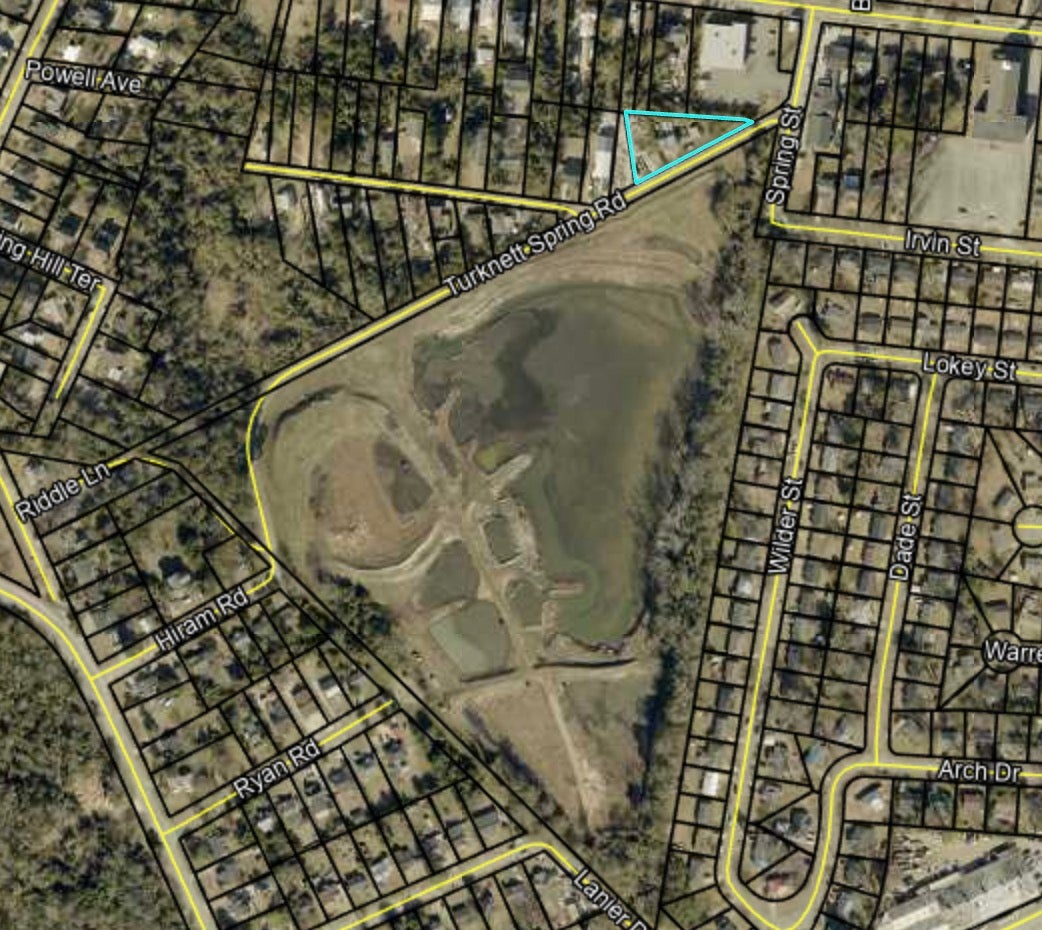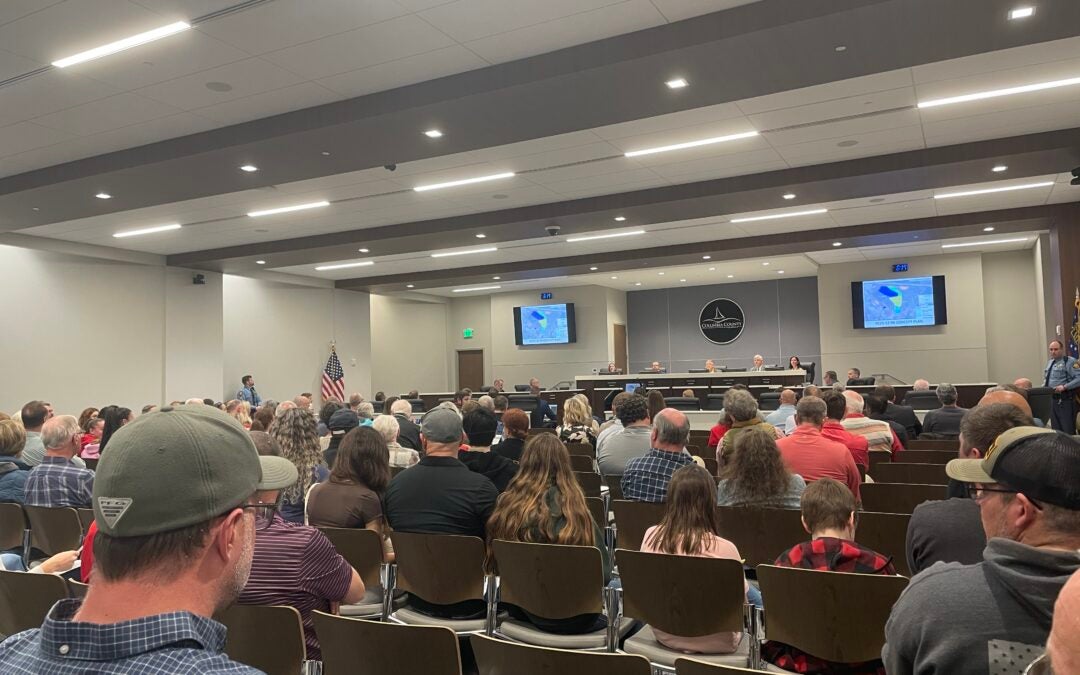Augusta commissioners tapped the brakes Tuesday on a $1.15 million change order for dredging a city pond used to store water treatment plant residue and control stormwater.
The Turknett Springs basin receives backwash from the Highland Water Treatment Plant and also serves as a detention pond, Utilities Director Wes Byne said. The change order would restore the pond to its prior capacity, he said.
Utilities partnered with Engineering and Environmental Services on the project. Engineering Director Hameed Malik was absent Tuesday.
The firm that dredged Lake Olmstead and Warren Lake in a 2020 procurement, Gator Dredging, is “still in town” but required a new scope to take on Turknett, Byne said.
Commissioners had several questions about the order. Mayor Pro Tem Wayne Guilfoyle asked if Florida-based Gator remains in the area. Byne said it is, but will need additional barges for Turknett..
Costs in the change order include $800,000 to dredge 50,000 cubic yards of sediment, $250,000 for mobilization of equipment and $100,000 for de-mobilization.
Commissioner Jordan Johnson said the price tag, for a capital item, “makes my eyebrows go up.” He added, “If you want to find waste and abuse, you can find it in that line.”
Byne defended the pricing. “Pricing in this market is surprising,” he said.
The committee forwarded the item to the full commission without a recommendation to give staff “more time” to answer questions.
No action taken on landfill fee hike
Mayor Garnett Johnson’s proposal to begin charging more to accept outside garbage at Augusta’s landfill received no action Tuesday.
The measure is “probably one of the most important matters that we have before our government.” Since the landfill’s inception, Augusta has likely shared access with neighbors, including Columbia, Burke and Aiken counties, he said.
Stormwater program director Oscar Flite, who also oversees landfill operations, said tipping fee changes are “a business decision” that could affect “whether people come here or go elsewhere.”
Augusta’s $40.30 per ton rate includes volume discounts. According to Flite’s presentation, Athens charges $65 per ton, but only serves Athens-Clarke and Oglethorpe counties. The Three Rivers Landfill in Aiken County charges $38 per ton and serves nine counties, it said.
Landfill operations, meanwhile, have improved since Environmental Services merged with Engineering three years ago, Flite said.
Since the landfill’s Phase 3 opened in 2010, tonnage has increased from 800 to 1,800 tons per day, he said. The landfill has saved money by paying for capital work from revenue, growing its own grass and earning about $1 million for storing mulch from hurricane debris. The department had a $6 million surplus in 2024, he said.
Risk of losing big landfill customer
Flite said the biggest likely risk is Waste Management redirecting garbage to its own landfill, east of Columbia, S.C., by opening a transfer station in between. The firm was recently rejected as Augusta’s new waste hauler.
“At some point they would sharpen their pencils and figure out what’s the tipping fee that we need,” he said. Losing the business would cost Augusta $4 million, Flite said.
Johnson said it makes no sense for residents to pay more when they own the landfill. “If they aren’t paying less, something is broken,” he said.
Flite said it is challenging to track which county generates waste brought in by commercial haulers. He said staff expect to return with a “full rundown” in a month.
Work on canal hurricane damage moves forward
The Engineering Services committee approved hiring Schnabel Engineering to design repairs for Augusta Canal embankments that sustained heavy damage during Hurricane Helene.
Byne said the damage created hazards for people using the upper part of the canal towpath, which led the city to close it to the public.
The closure will continue for several more months. After Schnabel designs the repairs, the actual work will have to be bid out then completed, he said.
More Helene response coming
A commission committee approved temporary licensing and permitting exceptions to aid Mennonite Disaster Service’s work on hurricane-damaged structures.
Former Mayor Deke Copenhaver, who is involved in Augusta’s long-term hurricane recovery, said the group targets “the greatest need” and “the worst of the worst” to assist. According to his brother, a former FEMA regional director, faith-based groups also “stay the longest and work the hardest,” Copenhaver said.
In other action: Financial matters
Commissioners heard results of a community budget survey. Assistant Administrator Mattie Sue Stevens said 771 people responded, prioritizing public safety and the court system and maintenance and infrastructure.
Augusta Regional Airport was cited most often as a department working well, she said. Other concerns raised by respondents included the Augusta Canal, homelessness, beautification and parks, such as the Riverwalk.
Budget decisions ahead
With the 2026 budgeting process starting next week, Administrator Tameka Allen asked commissioners to consider several questions.
They included whether to plan for a tax increase, make across-the-board cuts, allow or prohibit new projects, reduce funding for non-governmental agencies or cut subsidies for departments that lose money, such as Augusta Transit and the Richmond County Correctional Institution.
Quarterly report
In a review of Augusta’s latest financial report, Interim Finance Director Timothy Schroer highlighted his concerns about $7 million in un-budgeted employee healthcare costs, $1 million in unexpected prisoner healthcare, reduced savings from lapsed salaries as safety jobs now filled and and the millions Augusta had to refund with penalties and interest to the U.S. Treasury.
So far, Augusta has spent $65 million on debris removal and services in recovery from Helene, he said. With more expected, FEMA has reimbursed $34 million and insurance $1.25 million, Schroer said.













